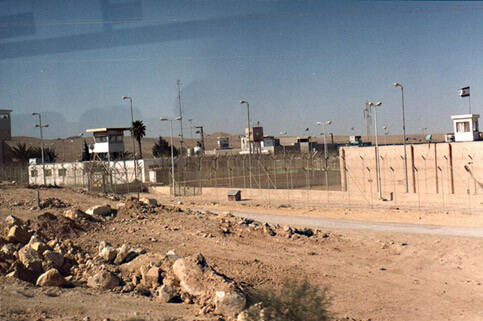Committee for the Families of Political Prisoners and Detainees 16 August 2004

In a bid to prevent the hungerstrike, Israeli authorities placed some Palestinian prisoners in isolation and banned family visits to other prisoners. Israeli authorities at Nafha prison (pictured above) transferred 120 prisoners to other detention camps in Israel.
During the month of August 7,500 Palestinian political prisoners will take part in a massive series of hunger strikes hoping to draw international attention and support to a campaign against the gross violations of their rights and against the appalling conditions under which they are being detained.
Whilst the Israeli authorities have tried to undermine the protest, dismissing it as a political action organized by the Palestinian Islamic Resistance Movement and Islamic Jihad, the complaints and demands of the prisoners clearly highlight the humanitarian nature of the campaign.
The prisoners complain of arbitrary and indiscriminate beatings, the firing of tear gas into cells and intimidation by guards with guns, humiliating strip searches of prisoners and the subjecting of prisoners to solitary confinement for excessive periods of time, for months and even years, arbitrary imposition of financial penalties, confinement of children with adult prisoners and political prisoners with criminals, withholding or delaying medical treatment, the withdrawal of studying privileges that in the past allowed prisoners to continue their high school or university studies through correspondence courses, and restrictions placed on family members entitled to visit and the denial of travel permits to family members living in the West Bank or Gaza so that they cannot travel to prisons to see their relatives. Some prisoners have endured more than a full year without visits.
Such treatment and conditions violate not only international law but also the Israeli state rules intended to govern the administration of prisons.
With the help of international recognition of these facts the prisoners seek only to alleviate these harsh conditions, their demands calling for the most basic necessities such as food, water and air and for a standard of treatment that meets humanitarian requirements.
In their statement entitled “the uprising of the empty stomach” the prisoners demand:
An end to collective and abusive punishment and to reintegrate the many prisoners held in isolation, improved visitation rights and visitor facilities, easing of restrictions regarding telephone calls and communication with families and lawyers, improvement of health facilities inside the prisons and the treatment of prisoners with emergency needs left without attention, provision of basic kitchen equipment such as cups as well as cleaning, bathroom and shaving products, recreational activities and books, ventilation of cells and removal of black covering from windows.
The prisoners also demand that legal documents and prison policies are made available to them in their own Arabic language and that they are treated above all according to the confines of the fourth Geneva Convention.
This campaign is not political rather its aim is to stop the excessively harsh treatment of Palestinian political prisoners and to ensure that the conditions under which they are imprisoned are consistent with international norms of human rights and basic decency.
The Committee for the Families of Political Prisoners and Detainees has planned a month of solidarity activities to coincide with the hunger strikes. Solidarity tents have been set up in the centre of all the cities in the West Bank and in all the Red Cross Centres and will be occupied by the public around the clock for as long as the prisoners’ strike lasts. The Palestinian Prime Minister’s office has declared August 18th a National Day for Prisoners for all Palestinians to show solidarity and all government ministers, members of the Palestinian National Council and heads of all political parties and several civil society organizations will join the public in the Solidarity Tents and fast in support of the prisoners.
The families of the Palestinian political prisoners plead with you, the members of the international community, to join in solidarity with their sons, daughters, fathers, mothers, brothers and sisters who are being held in Israeli prisons by organizing an International Day of Solidarity with Palestinian Prisoners on September 4, 2004 and by registering your own protest with political representatives and government ministers that they may bring pressure on the government of Israel to cease these violations of law and to treat Palestinian prisoners as human beings entitled to basic human rights.
Action
Addresses of Israeli government officials
Related Links